AI SEO for Ecommerce: Top Strategies to Rank in ChatGPT in 2025
The days of ten blue links are fading fast. Shoppers now ask tools like ChatGPT or Gemini for instant, conversational product answers. AI SEO for ecommerce is the new game-changer. Unlike traditional search engines, generative AI scrapes, analyzes, and synthesizes product data to deliver one trusted recommendation.
A recent report by Adobe suggests that between November 1 and December 31, 2024, U.S. retail websites received a 1,300% increase in traffic from generative AI searches compared to the prior year.
This shift is massive. If your products don’t surface in AI-generated responses, you risk losing visibility and sales to competitors who adapt quickly.
AI-powered recommendations reshape the buyer’s journey. They combine product descriptions, reviews, pricing, and brand trust into one concise answer that influences customer decisions directly.
That means ranking inside AI-generated responses is not optional. It is mission-critical for Shopify merchants and ecommerce brands planning for long-term growth.
In this blog, we’ll explore 11 essential strategies designed to help your products stand out in AI-driven search.
From structured data and semantic content hubs to personalization and predictive SEO, these strategies will prepare you to rank in ChatGPT in 2025.
Why Does AI SEO Matters in Ecommerce?
It goes without saying, AI SEO is no longer optional for ecommerce websites. With the rise of AI crawlers and AI-driven search, visibility now depends on adapting to discovery models.
AI crawler traffic accounts for nearly 30% of Google’s market share, and this number is growing steadily. Generative AI is already reshaping consumer behavior. During the 2024 holiday season, Adobe reported a staggering 1,300% increase in generative AI traffic to U.S. retail sites compared to the prior year. By February 2025, this trend persisted with a 1,200% increase over July 2024.
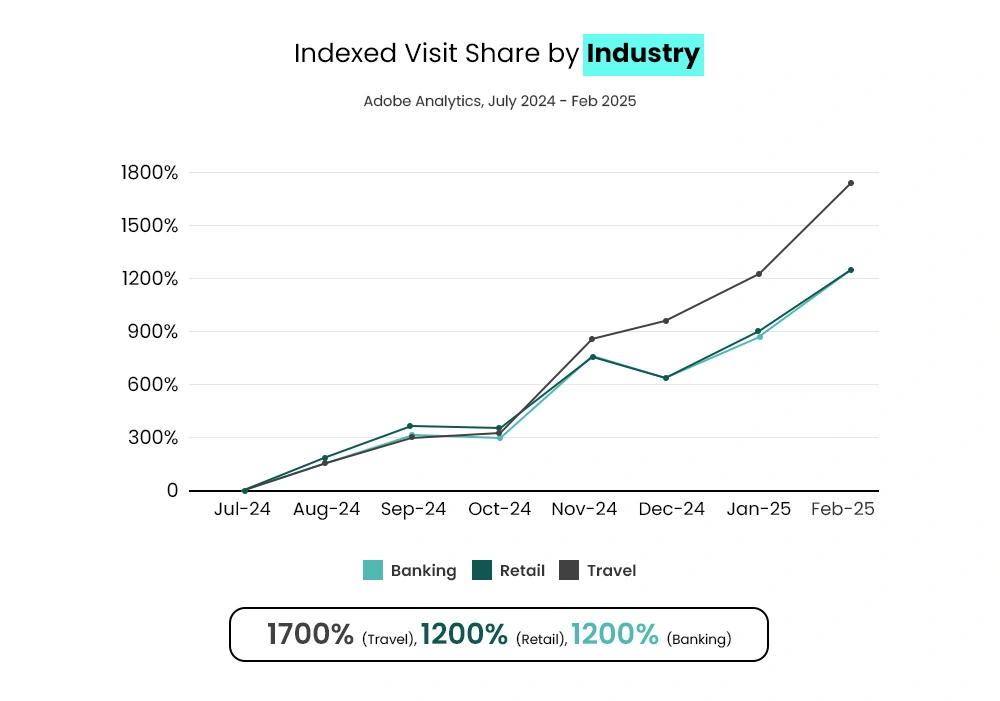
This shift highlights the importance of AI SEO for ecommerce and long-term ecommerce AI optimization. The data speaks for itself:
- Users referred from AI-powered search spend 8% longer on-site and browse 12% more pages. Bounce rates drop by 23% compared to traditional referrals.
- 39% of consumers use generative AI for shopping, 55% for research, and 47% for recommendations.
- By 2025, 30% of online searches will be visual, driven by Gen Z and millennials.
- AI-driven personalization boosts repeat purchases for 44% of businesses.
Simply put, mastering AI SEO ensures your products appear where modern shoppers make decisions.
Difference Between Traditional SEO and AI SEO
Some believe AI SEO is just hype, but the numbers prove otherwise. ChatGPT alone grew from 300M to 400M weekly users in two months, with projections hitting 1 billion by 2025. For ecommerce, this shift can’t be ignored.
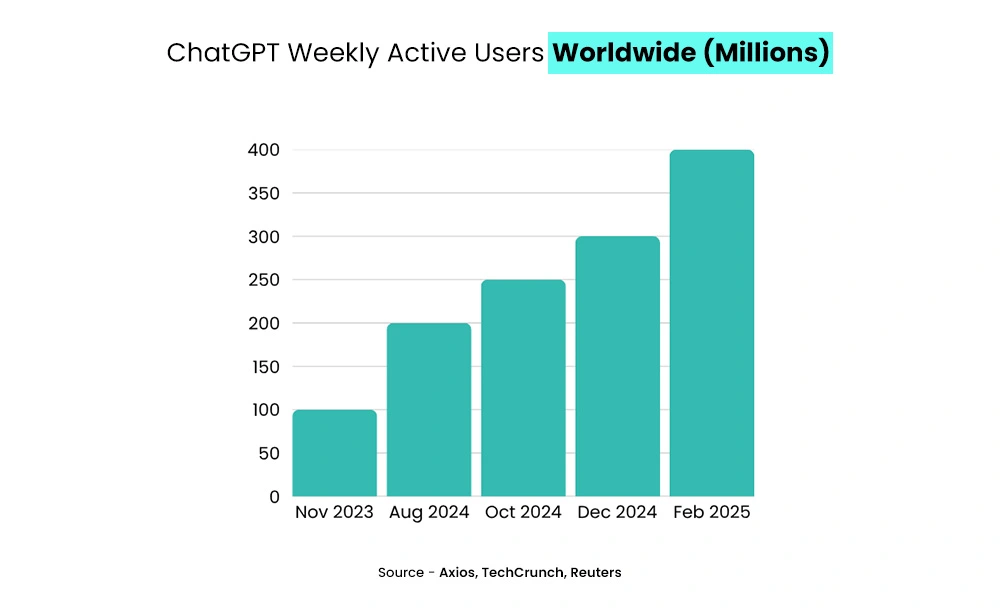
Traditional SEO focuses on ranking in search engines like Google and Bing, but AI SEO for eCommerce works differently. AI search engines like ChatGPT, Gemini, and Perplexity scrape, synthesize, and present answers in natural conversation, often showing fewer—but more targeted—results.
Here’s the key difference:
- Traditional SEO: Optimizes for blue links, keywords, backlinks, and SERP features.
- ChatGPT SEO and AI SEO strategies: Focus on structured data, conversational content, and relevance to optimize content for AI research.
- User Behavior: Google users search in short keywords. ChatGPT users ask questions in full sentences, changing the context of results.
While the fundamentals remain rooted in SEO, ecommerce brands must leverage AI to adapt to this evolving search behavior. Ranking on Google no longer guarantees visibility in AI-driven product recommendations.
That’s why adopting AI SEO strategies now is critical to future-proof your ecommerce store.
– Checkout Our BFCM Offer Here: Mastroke BFCM Offer- Launch Your Dream Shopify Store at just $99!
Impact of Ecommerce AI SEO: Shopping on Google vs. ChatGPT
On Google, searches are short and broad:
- Example: “Black running shoes similar to Hoka”
- Traits: Short, less targeted, keyword-driven
- Results: Sponsored ads, product carousels, and snippets with structured data like reviews and pricing
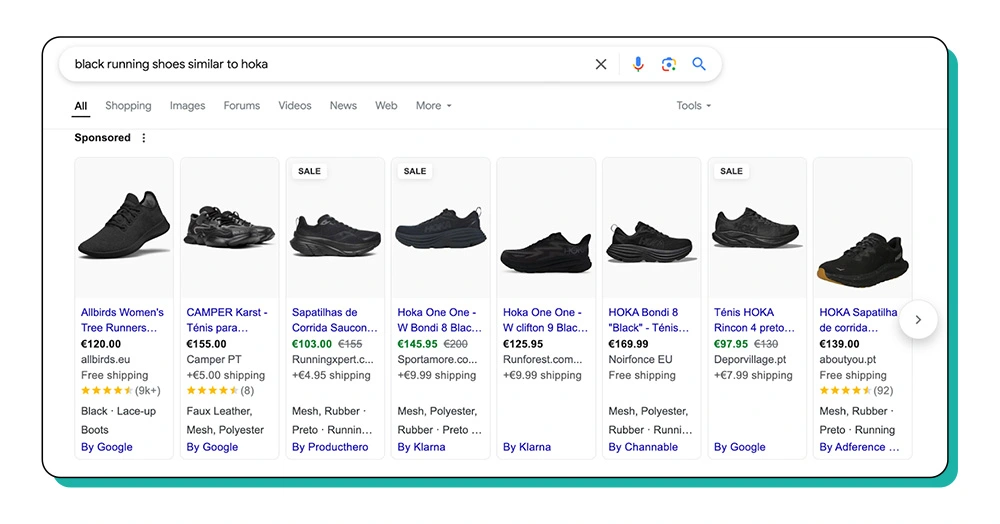
On ChatGPT, searches are conversational and detailed:
- Example: “I am looking for black running shoes. Can you suggest brands similar to Hoka?”
- Traits: Long-tail, specific, question-based
- Results: Curated brand suggestions, comparisons, and context-rich recommendations
This contrast shows why ecommerce AI SEO matters. Ranking on Google doesn’t guarantee visibility in ChatGPT. To win, ecommerce websites must optimize for search intent, structured data, and conversational content tailored for AI-powered, answer-driven search experiences.
– Read our festive blogs here: 11 Holiday Marketing Ideas for Shopify Brands That Want to Stand Out
Top 11 Strategies to Rank Shopify Products in ChatGPT
Check out these top strategies to rank your Shopify products in ChatGPT.
1. Implement Comprehensive Schema Markup
Schema markup is a must-have for AI SEO for ecommerce. It helps AI-driven search engines read and display product data with accuracy.
Key elements to include:
- Product Schema: Add name, description, price, availability, brand, and GTIN/SKU.
- Review and Aggregate Rating Schema: Showcase trust signals with ratings and user reviews.
- FAQ Page Schema: Structure Q&A content for conversational AI platforms.
These structured signals improve ranking factors by making your products easier to interpret in both search and ChatGPT-style results.
Adopting dynamic ecommerce SEO strategies with proper markup ensures your store stands out in competitive results.
Follow the best practices for e-commerce structured data for AI to boost visibility and conversion potential.
2. Embrace Conversational & Natural Language Content
To win with AI SEO for ecommerce, brands must write in a way that matches how shoppers ask questions in conversational search.
Key approaches include:
- Write friendly content that mimics real queries, such as “Is this product good for daily running?”
- Go beyond specs by explaining why and how customers will use the product.
- Replace short bullet points with descriptive paragraphs that flow naturally.
These AI optimization & best practices for visibility products help your listings appear in ChatGPT-style answers and generative search platforms.
By creating content that feels natural, relatable, and solution-driven, ecommerce websites can capture intent-rich queries and drive more qualified traffic.
– Read our festive blogs here: Top Holiday Marketing Strategies for Shopify Stores in 2025
3. Showcase Detailed User-Generated Content (UGC)
AI SEO for eCommerce thrives on authentic voices. Ecommerce product AI tools and generative platforms prioritize UGC because it reflects real-world experiences and product value.
Why UGC matters for the best SEO for AI visibility products:
- AI-powered search uses reviews, Q&As, and testimonials to shape contextual recommendations.
- Repeated phrases from customers—like “budget-friendly” or “best noise cancellation”—directly influence search engine results pages (SERPs).
- By 2030, UGC will fuel 80% of SEO-friendly content generation.
How to optimize UGC for ecommerce AI optimization:
- Encourage detailed reviews with real product experiences, not just ratings.
- Add Q&A sections to build trust and authority with users and AI bots.
- Showcase unboxing videos, images, and testimonials across channels for stronger credibility.
UGC is no longer optional—it’s a ranking factor that boosts AI-driven discovery and long-term visibility.
4. Build Topical Authority with In-Depth Guides
AI platforms prioritize expertise and credibility when ranking AI SEO for Shopify stores. Building topical authority strengthens trust and boosts visibility in Ecommerce AI SEO results.
Key steps to establish authority:
- Use keyword research to identify customer questions and pain points, and then align your content with their real intent.
- Next, create in-depth guides, tutorials, and buying resources that naturally link back to your product pages.
- Additionally, publish consistently across multiple channels like YouTube, Reddit, and TikTok to expand your reach and reinforce topical authority.
- Finally, ensure transparent company details to build user trust and strengthen your credibility across all platforms.
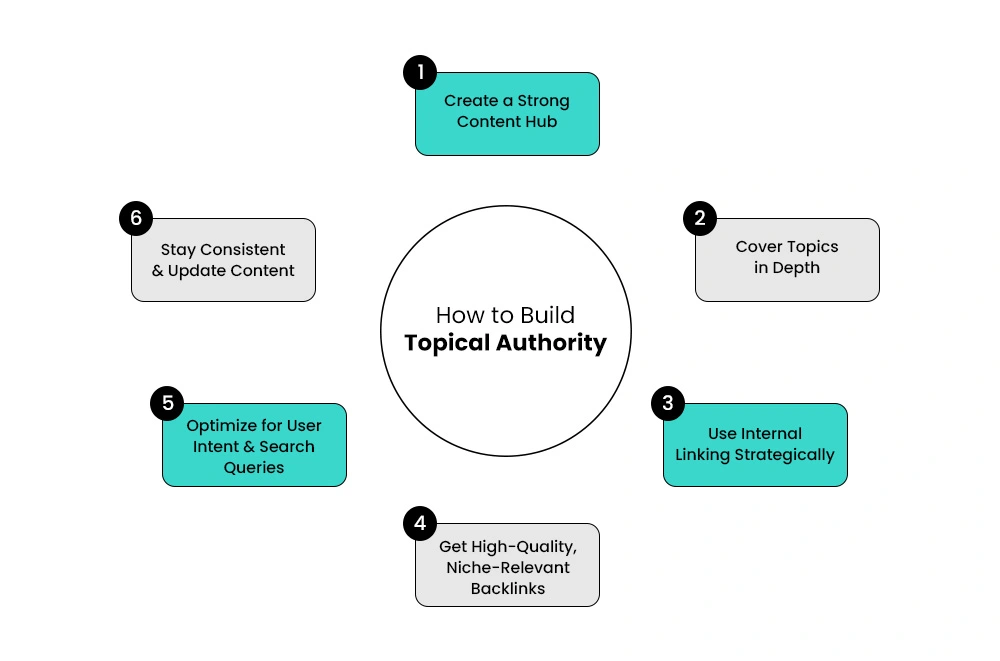
This approach to creating content positions your brand as an expert, not just a seller. AI models reward detailed, trustworthy information by highlighting it in conversational search. The more comprehensive your guides, the more likely they will influence AI-driven recommendations and long-tail queries.
Topical authority is no longer optional—it’s the foundation for ranking higher in generative search.
5. Voice Search Optimization
Voice search is becoming central to ecommerce SEO. Today, 21% of users rely on voice search regularly, and 52% use it for product research. With AI assistants like Siri, Alexa, and Google Assistant gaining traction, voice queries are shaping how shoppers discover brands and products.
To optimize for this trend, use AI SEO tools and focus on structuring content for quick, conversational answers.
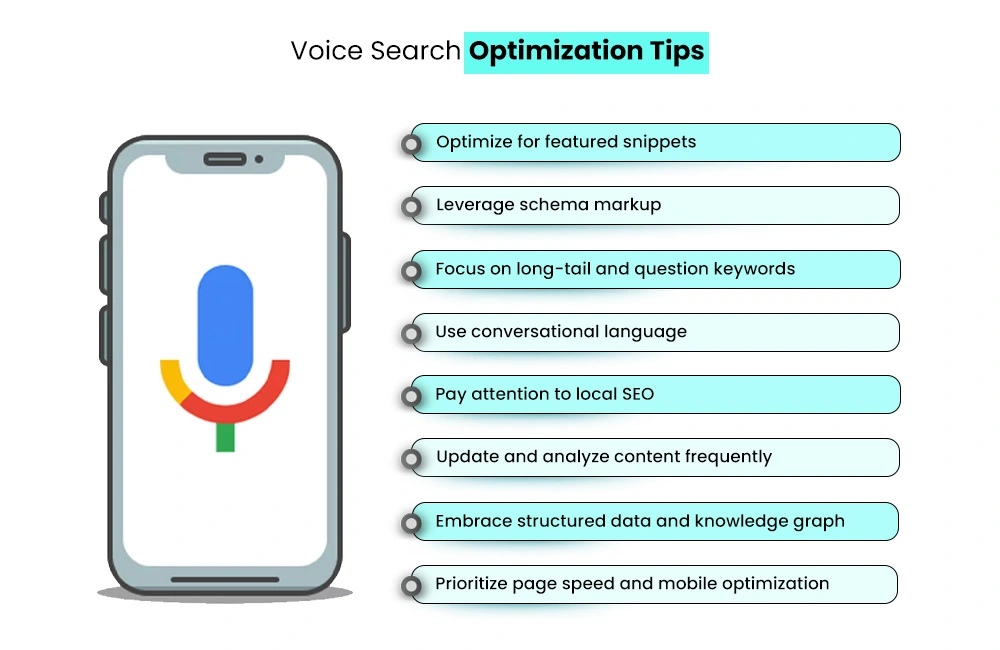
Best practices include:
- Optimizing product descriptions for AI chatbots with natural, long-tail keyword phrases.
- Adding FAQ sections with direct, concise responses to common shopper queries.
- Using AI tools to identify voice-driven search patterns and refine content accordingly.
Since 40% of voice assistant users search for product details, clear and structured answers help your ecommerce site appear in AI-driven results.
Voice optimization is no longer optional—it’s a ranking factor in AI-powered search.
6. Monitor and Fix JavaScript, Mobile, or Crawl Issues
AI SEO for ecommerce depends on making sure your site is fully visible to both search engines and AI crawlers. Hidden or blocked content limits your reach.
Key practices include:
- Reduce JavaScript reliance for critical elements, as many AI bots struggle with JS-rendered content.
- Run regular crawl audits to identify errors, broken links, or hidden pages.
- Ensure mobile-first design, since most ecommerce searches happen on smartphones.
- Check structured data visibility, making sure essential product details are accessible to crawlers.
By monitoring crawl paths and improving mobile usability, you make your ecommerce site AI-ready. Fixing these issues ensures content appears consistently across search engines and AI platforms.
Strong technical visibility builds trust with bots and keeps your products in AI-powered recommendations.
– Read our festive blog here: 7 Effective Christmas Marketing Ideas for Shopify Brands Chasing Last-Minute Buyers
7. Focus on E-E-A-T in AI Content
AI SEO for ecommerce relies on Expertise, Experience, Authority, and Trust (E-E-A-T). Shopify AI SEO works best when your product pages prove credibility. Key practices include:
- Show expertise by providing accurate, detailed product descriptions with verified data.
- Build authority through backlinks, guest posts, and high-quality guides.
- Add trust signals like secure checkout, clear return policies, and brand transparency.
- Leverage user reviews and UGC, as AI engines read these signals to recommend products.
- Use verified ratings, which boost credibility in both search results and AI-generated answers.
Strong E-E-A-T not only increases organic traffic but also ensures your brand earns visibility in AI SEO results. By proving reliability across product pages, ecommerce brands position themselves as trusted sources for AI-driven recommendations.
8. Utilize Growing Social Media Marketing
Social media isn’t just for engagement, it’s becoming a powerful ally for AI SEO for ecommerce. Platforms like Instagram, TikTok, and YouTube now influence search rankings and drive organic discovery in real-time.
When combined with dynamic ecommerce SEO tricks, social signals can significantly boost visibility and improve your click-through rate. Here’s how to leverage it:
- Share optimized product posts and UGC to drive engagement that signals trust to search engines.
- Use AI-powered tools to analyze real-time social trends and align campaigns with seasonal search behavior.
- Encourage backlinks and mentions from social platforms, strengthening authority while feeding SEO signals.
By integrating social content into your SEO plan, you don’t just capture attention—you turn followers into buyers and strengthen rankings in an AI-driven search world.
9. Target Semantic Entities, Not Just Keywords
AI-powered search engines interpret concepts and relationships—not just exact matches. To rank as top-ranked in conversational results like ChatGPT, optimize around semantic entities tied to your products and brand.
- Focus on user intent with long-tail, conversational phrasing (e.g., “Bluetooth headphones with ANC under $100”).
- Map product pages to entities: brand, features, use-cases, materials, compatibility, price tiers, and comparisons.
- Enrich pages with structured data and internal links that reinforce entity relationships.
- Use keyword research to cluster topics by entity (features, problems, outcomes), then cover each with concise, expert copy.
- Align FAQs and specs to the natural questions AI systems surface.
Applied well, AI SEO for ecommerce goes beyond keywords: entity-driven content improves context, credibility, and relevance—powerful AI SEO tips for winning product visibility and rankings.
10. Adapt to Natural Language Processing (NLP)
AI search engines use NLP to decode user intent and deliver contextual responses. For effective AI SEO for ecommerce, structure content to match conversational search patterns that ChatGPT and similar platforms prioritize.
Optimize content creation with these approaches:
- Write ChatGPT-ready product listings using natural, conversational language that mirrors real customer questions.
- Then, format product descriptions, specs, and FAQs to directly answer “how,” “why,” and “which” queries in a way shoppers immediately understand.
- Additionally, structure your pages with clear headings, bullet points, and scannable sections to help AI parse and surface your content accurately.
- Moreover, include everyday phrases and entity-based terms that customers actually use when shopping.
- Finally, create product content that flows naturally when read aloud, effectively mimicking the spoken queries people use with voice assistants and AI search tools.
Key implementation:
- Replace “premium wireless earbuds” with “best wireless earbuds for workouts under $150”
- Use conversational transitions and complete sentences in product copy
- Align headings with common customer search patterns
This natural language approach helps AI systems better understand and recommend your products in search results.
11. Track AI Mentions and Traffic
- Monitor your brand with tracking tools to catch every mention in AI-driven results.
- Use UTM codes on product pages cited by AI models whenever possible.
- Measure which AI SEO for ecommerce mentions send real site traffic.
- Analyze what high-quality referrals are coming from AI-generated content.
- Optimize AI SEO for products by tracking which mentions drive conversions.
- Refine your content based on real data, not just rankings.
- Stay alert to trends—AI sources shift fast, and so do referral sources.
– Read our festive blog here: 9+ New Year Marketing Ideas for Shopify Store Owners to Keep Sales Rolling
Action Plan for Ecommerce AI SEO Success
Stepwise approach to auditing and optimizing ecommerce stores for AI visibility
An AI SEO for ecommerce success plan starts with a clear step-by-step approach. You must ensure products are easily discoverable and optimized for AI visibility.
- Audit Your Store- Check site structure, internal links, and mobile performance. Identify gaps that reduce visibility for AI-driven search engines.
- Optimize Product Pages- Use structured data, descriptive titles, and keyword-rich copy. Ask yourself: Is it best SEO for AI visibility products?
- Content Strategy- Create blogs, FAQs, and guides around buyer intent. This helps search engines connect your store with relevant customer queries.
- Improve User Experience- Ensure fast loading, smooth navigation, and secure checkout. A seamless journey improves conversions and supports AI-powered ranking signals.
- Measure and Adapt- Track click-through rate, conversions, and engagement. Adjust content and campaigns as AI-driven search evolves.
List Tools and Resources
Use these tools to implement effective SEO strategies:
- Google Search Console – Track indexing and visibility.
- Ahrefs / SEMrush – Conduct keyword and backlink research.
- Screaming Frog – Audit technical SEO issues.
- Surfer SEO – Optimize content for AI-driven SERPs.
- ChatGPT Plugins / AI SEO Tools – Generate insights for better visibility and real-time optimization.
By following this plan, your ecommerce store builds stronger visibility, drives sales, and stays competitive in an AI-first search landscape.
Conclusion
The future of ecommerce search is changing fast, and brands that adapt early will win. AI SEO for Ecommerce is no longer an option—it’s the foundation of visibility in 2025. By focusing on structured product data, dynamic content strategies, and real-time optimizations, you ensure your store ranks not only in traditional search engines but also in conversational platforms like ChatGPT.
The best part? These strategies do more than boost rankings—they improve customer experience, increase click-through rate, and drive long-term loyalty. Every product description, every review, and every keyword now plays a role in how AI systems understand your store.
Start small with audits, test innovative tools, and scale your efforts as AI-driven search evolves. With the right approach, your ecommerce business will stay ahead of competitors and secure its place in the future of online shopping.
FAQs-
Here are some FAQs to read here:
1. Why is Video Content Important for AI SEO?
Video improves engagement, increases time on site, and signals relevance to AI algorithms. When optimized with transcripts, keywords, and schema markup, videos enhance visibility in AI search results, boost click-through rates, and help ecommerce products rank higher by offering dynamic, context-rich content that AI platforms value for user experience.
2. How to get products listed in ChatGPT’s search?
Ensure your product pages are optimized with accurate schema markup, structured data, and fresh content. Build authority through backlinks, reviews, and E-E-A-T signals. AI search engines like ChatGPT prefer brands with transparent, trustworthy product information. Regular audits, real-time updates, and AI SEO strategies increase your chances of products being surfaced in responses.
3. Does ChatGPT use product schema markup?
Yes, schema markup helps ChatGPT understand and categorize product information more accurately. Structured data—such as pricing, availability, reviews, and product descriptions—improves visibility. It ensures AI platforms provide clear, reliable, and relevant results to shoppers. Adding schema markup is a direct way to align ecommerce stores with AI-driven search visibility requirements.
4. How to improve product E-E-A-T for AI search?
Focus on Experience, Expertise, Authoritativeness, and Trustworthiness. Showcase customer reviews, UGC, and testimonials. Use verified ratings, author bios, and clear product descriptions. Build brand authority with backlinks, certifications, and real-time updates. Transparent return policies and responsive customer service further enhance trust, helping products rank better in AI-driven ecommerce search platforms.